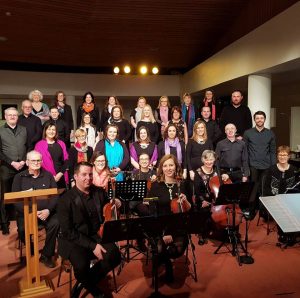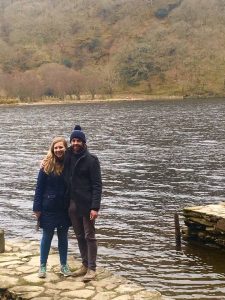As this year of ministry ends, there are so many memories and lessons to reflect upon for myself as a Teach Bhride member who was lucky enough to experience two years of living in Wexford. How could I possibly articulate the impact this Clonard community has had on me? How would I even have the right words to describe the beauty of this country? The Irish/American culture integration? The experience of ordinary faith through ordinary trial? Looking back at my time, its not easy to make a clear and synthesized list of life lessons like any old online article or blog, but I can at least take a crack at it! 
Americans who find themselves on Irish soil realize pretty quickly that they’re encountering something serenely special and unique. The scenery alone could make you melt. One of my first memories in Wexford was a simple drive along a very narrow winding road with surrounding hedges and trees. (definitely not as common in my home-state, Arizona). I remember all the subsequent drives (probably at least a hundred) that I experienced on this island, whether it was on a bus or with a friend (nun, priest, or parishioner) in the driver’s seat, talking about anything that came to mind, listening to all kinds of music, and enjoying the company all the while. These drives could take you across green rolling hills to farmland with sheep and cattle, into small towns with colorful little shops, to quaint rural houses, to old churches, to harbors, to bridges, to castles, to beaches, to exquisite gardens, to breath-taking cliffs that overlook the Irish sea. Even if you were simply here for a week, it’s easy to fall in love with Ireland’s variety of beauty. 
One thing that has been wonderful about my time in Ireland is how many nuances and subtle aspects of Irish culture that I am still learning even after being here for so long. My own “American tendencies” have been highlighted to me as time went on – things I didn’t even think about before. Without trying to generalize or stereotype, these are just some examples of culture differences that I personally noticed:
Americans can be very animated when it comes to facial expressions. We usually speak in higher volumes, and sometimes express ourselves with a lot of conviction. We like to use hand gestures and rattle off examples to make our arguments firm and convincing. Irish on the other hand, while they can also be very animated, tend to speak in lower tones, take a more relaxed posture, and often gesture with their head or chin. They’re version of persuasion is with a moderate, conservative demeanor, and are less likely to display as much emotion unless they’re with close family or acquaintances. They tend to be realists by thinking about practicality, while Americans like to dream and idealize.
Americans like to have a set goal, accomplishment or agenda for the sake of efficiency, especially when it comes to work. As previous students, we Americans are used to deadlines and assignments that have an end task or objective that is tightly-focused, like a graded test or paper. We place an emphasis on productivity and measure success with how much is accomplished. An Irish agenda is similar, but generally speaking, daily conversations can easily veer off-track. From the weather, to general health, to really, anything. The emphasis is more on the chat (sometimes, banter too) and the subject matter has no bounds. Its great craic. Take this with a grain of salt, because I know many Americans get side-tracked as well, and Irish to-do lists are very efficient and practical. I’ve only noticed that when you start speaking with an Irish person, the conversation could entail an extra 10 minutes, give or take. The fact that I’m worked in a lovely church community (with tea-breaks galore) definitely factors in, but I think there’s a certain “laid-back” quality to the culture here that I really enjoy. On many different levels, I’ve learned to integrate both the practical and the ideological as a means of connecting with people. Afterall, the job always gets done and friendships can always grow. 

I’ve often heard people describe the Irish culture as more “down-to-earth.” Whenever I hear this term, I’ve always wanted to pin-point what that term really means, especially in an Irish context. One thing that I’ve noticed is how easy it is for an Irish person to laugh at themselves, (in a great way) and they can even make a joke at their own expense. This doesn’t always seem to be the case for Americans. Americans are generally much more sensitive than the Irish, especially when it comes to the smaller stuff or constructive criticism. I, myself, have always had a hard time letting the little remarks just not bother me on some level (even when it is just a joke). As a highly politicized country, we Americans are very accustomed to being politically-correct, hyper-aware of any form of insult or malice, and perhaps just down-right untrusting of others. This sort of attitude creates tension on lots of levels. I think on a personal level, it created a need for me to take care of other peoples’ feelings at all costs, as well as assert my own feelings as highly significant, almost to an unhealthy level. When trying to please people, my aim was simply to not mess up and not offend people, while also having confidence in my personal beliefs and convictions. But this mentality restricted my growth, as well as limit the potential to meet people with authenticity. I think the more I’ve realized how okay it is to make mistakes (no matter where I am), the more I see how small I am – my life is not about me, and that realization brings a sigh of relief. No one expects me to do anything perfectly, I am not ultimately responsible for the feelings of others. I am who God made me to be and I can always grow into that person more, and even more importantly, I can connect to and accept all the other people in the Body of Christ who might make their own mistakes too. It reminds me of a friend I have back in Arizona – we used to call each other, “My Aristotelian Friend,” relating to Aristotle. His philosophy was that the highest degree of friendship was a friendship of virtue. Someone who can call you out when you need it. Someone who cares about you enough to be frank and honest with you, who sees all of you. It’s a very special bond to have. I believe it is a bond that Christ can have with all of us. I hope to continue to seek out that kind of friendship with Him so that I continuously see myself through His eyes, through real affirmation and unconditional love. I speak here mostly from my own experience when I say that being sensitive is not an inherently bad thing, but it is refreshing to be aware of its interior grip on the way we communicate and ingratiate our experiences. It can distract us from seeing our own mistakes in a healthy way. Rather than walking around in a defensive posture, we can allow ourselves to be self-compassionate vs. self-absorbed about our own failings. Rather than carrying on with any sort of pretention or need to “prove oneself,” we could allow ourselves to take the posture of humility or self-indifference, where we let go of our pride and our need to be heard, successful, or understood.
A longstanding joke in my family is a phrase that my late Grandpa Bob used to say most days. “Wait til’ you hear, I did something really dumb today.” I have a deep appreciation for this Irish quality, admitting and laughing at your own mistakes, and never taking oneself too seriously. I’ve fallen in love with the Irish in more ways than one, but I am also very proud to be an American and to have had these two years of incomparable life experience. Now whenever I hear the term, “down-to-earth,” I’m reminded of St. Brigid and her invitation that led me to this beautiful country. She gave me the chance to grow in the ways of humility, confidence, and inner strength. I’m also reminded of the fact that we’re all making mistakes now and again – whether American, Irish, whoever – it’s part of what makes us human. In the grand scheme of things, what lasts are the connections that leave their imprint on you and how you can learn from them. Most of the time, these mistakes call you to grow in love towards yourself and others in new, challenging, and wonderful ways. I’m proud to say that I’ve gained a lot of imprints here in Wexford over the last two years. Looking back at photos (So Many Photos), I’m proud of the work that I’ve done, of the friendships I’ve formed. I will never stop being grateful for my time as a House of Brigid fellow. I’m grateful for the love I’ve shared, and the lessons that I’m sure will keep coming back to me through all the memories long after.






Beautiful piece Bernadette! Your writing captured the beauty of Ireland and the warmth of the Irish people you met. I know the imprints will stay with you for a long time to come 🙂 What a blessing these two years were!!